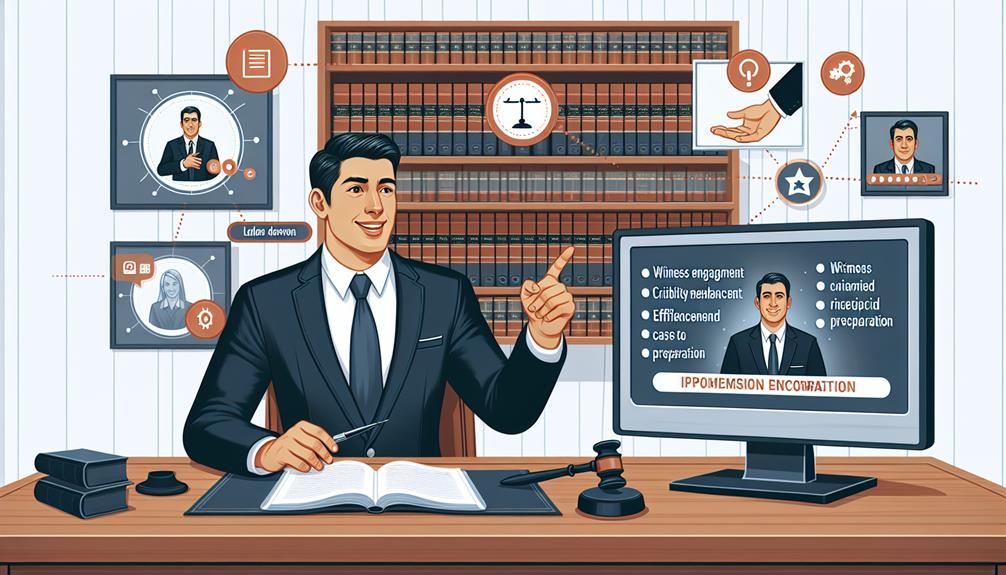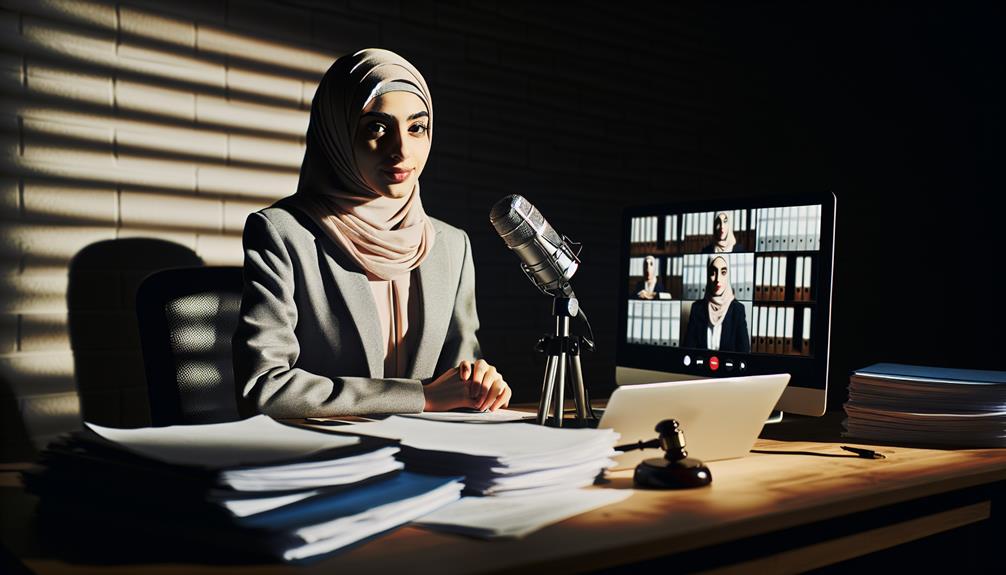As someone who has experienced the high stakes and intense pressure of video depositions, I know firsthand the importance of following these invaluable tips.
In a world where first impressions can make or break a case, it is crucial to navigate the intricacies of video depositions with finesse and precision.
But why should you bother with these tips? Well, let's just say that a well-executed video deposition can mean the difference between a successful outcome and a missed opportunity.
So, if you want to ensure your credibility, capture crucial evidence, and gain a competitive edge, then buckle up and get ready for a game-changing journey through the world of video depositions.
Key Takeaways
- Video depositions offer numerous benefits, such as capturing emotions and non-verbal cues, enhancing the jury's perception of the case, and allowing for a deeper connection with the testimony.
- A well-equipped and properly set up video deposition room, high-quality video and audio recording equipment, sufficient lighting, and a comfortable environment for all parties are essential elements for a successful video deposition.
- Thorough preparation, including reviewing relevant case materials, becoming familiar with the facts and issues at hand, and creating a detailed outline or list of key topics and questions, is crucial to ensure targeted and informed questioning.
- Seeking advice from experienced professionals, conducting a test run, creating a professional and distraction-free environment, and avoiding common mistakes such as ineffective questioning and bias in questioning can greatly contribute to the success of video depositions.
Benefits of Video Depositions

Video depositions offer numerous advantages for legal proceedings, providing a persuasive and dynamic way to present testimony and evidence. One of the key advantages is the ability to capture the emotions and non-verbal cues of the deponent, which can significantly impact the jury's perception of the case. When viewers can see the deponent's facial expressions, body language, and tone of voice, they're more likely to connect with the testimony on a deeper level.
Another advantage of video depositions is the ability to easily replay and review the footage. Unlike traditional written transcripts, videos allow attorneys to analyze and study the deponent's responses in real-time. This can be particularly helpful in identifying inconsistencies or contradictions in their testimony, which can be crucial for building a strong case.
Furthermore, video depositions can save time and resources. With video technology, it's possible to conduct depositions remotely, eliminating the need for travel and reducing expenses. This not only streamlines the process but also allows for more flexibility in scheduling.
Key Elements for a Successful Video Deposition
To ensure a successful video deposition, it's essential to carefully consider and prepare key elements to effectively present testimony and evidence. Video deposition techniques play a crucial role in capturing the nuances of a witness's testimony and presenting it to the audience in a compelling manner.
One key element is to have a well-equipped and properly set up video deposition room. This includes having high-quality video and audio recording equipment, sufficient lighting, and a comfortable environment for all parties involved.
Another important element is the effective questioning strategies used during the video deposition. It's essential to ask clear and concise questions that elicit the desired information from the witness. This requires careful preparation and knowledge of the case. Open-ended questions can encourage the witness to provide detailed responses, while closed-ended questions can be used to obtain specific facts.
Additionally, it's crucial to establish a professional and respectful atmosphere during the video deposition. Maintaining a calm and composed demeanor can help put the witness at ease and encourage them to provide accurate and truthful testimony. Non-verbal cues such as body language and tone of voice should also be considered to ensure effective communication.
Essential Preparation Steps for Video Depositions

When preparing for video depositions, it's crucial to take certain essential steps to ensure a successful and effective deposition process. Proper preparation techniques can make all the difference in conducting a deposition that yields valuable information and supports your case.
First and foremost, it's important to thoroughly review all relevant case materials and documents before the deposition. This will help you become familiar with the facts and issues at hand, allowing you to ask targeted and informed questions. Additionally, it's advisable to create a detailed outline or list of key topics and questions to guide the deposition. This will ensure that you cover all necessary areas and prevent important information from being overlooked.
In addition to preparation, effective communication is vital during video depositions. It's essential to establish a clear and professional demeanor, as well as maintain good eye contact with the deponent. Speaking clearly and concisely will help ensure that questions are understood and answered accurately. Active listening is also crucial, as it allows you to respond appropriately and follow up on important points.
Expert Advice for Conducting Video Depositions
One key aspect to keep in mind for successful video depositions is seeking expert advice from experienced professionals in the field.
When it comes to conducting video depositions, there are a few best practices for remote depositions and technology tips that can greatly enhance the process.
First, it's important to ensure that you have a reliable and secure internet connection. This will help minimize any disruptions or technical issues during the deposition. It's also a good idea to conduct a test run before the actual deposition to familiarize yourself with the video conferencing software and equipment.
Another important tip is to create a professional and distraction-free environment. Choose a quiet location with good lighting and minimal background noise. Make sure you dress appropriately and maintain a professional demeanor throughout the deposition.
Furthermore, it's crucial to properly prepare for the deposition. Review the case documents and create a detailed outline of the questions you plan to ask. Practice active listening and take thorough notes during the deposition to ensure accuracy.
Common Mistakes to Avoid in Video Depositions

A common mistake in video depositions is failing to establish clear communication protocols with all participants involved. This can lead to confusion, delays, and a lack of efficiency during the deposition process. To avoid this trap, it's essential to ensure that everyone understands their roles and responsibilities, the technology being used, and the overall objectives of the deposition.
Another mistake to avoid is ineffective questioning. As the video deposition is a crucial opportunity to gather information and evidence, it's important to ask clear and concise questions that elicit relevant and informative responses. This requires careful preparation and a deep understanding of the case.
Additionally, it's important to be mindful of potential traps that can arise during a video deposition. These traps can include leading questions, improper objections, or bias in questioning. By being aware of these potential pitfalls and preparing accordingly, you can navigate the deposition smoothly and effectively.
Conclusion
In conclusion, following these video deposition tips can greatly enhance the effectiveness of your legal proceedings. By choosing video depositions, you can benefit from improved witness testimony and presentation, creating a more compelling case.
Remember to focus on key elements such as lighting, audio quality, and body language to ensure a successful video deposition.
By adequately preparing and seeking expert advice, you can avoid common mistakes and conduct video depositions efficiently and professionally.

